Impact of SDOH and PPHC on Nursing Practice and Health Outcomes
VerifiedAdded on 2022/08/17
|6
|2146
|10
Essay
AI Summary
This essay delves into the critical aspects of social determinants of health (SDOH) and the principles of primary health care (PPHC), examining their profound influence on both individual and population health. The paper begins by defining SDOH, encompassing factors like education, income, employment, and cultural background, and how these elements shape health outcomes. It then explores the PPHC principles, emphasizing equitable access to healthcare and community participation. The author reflects on their evolving understanding of health, expanding from a disease-focused perspective to encompass social, mental, and spiritual well-being. The essay contrasts the SDH and PPHC concepts with the biomedical model of health, highlighting the significance of lived experiences and individual circumstances in patient care. It emphasizes the need for nurses to deliver person-centered care, considering a patient's social and economic context to improve care plan feasibility and patient compliance. The paper concludes by underscoring the importance of SDOH and PPHC knowledge in future nursing practice, advocating for empathetic, culturally competent care, and advocating for patients' needs.
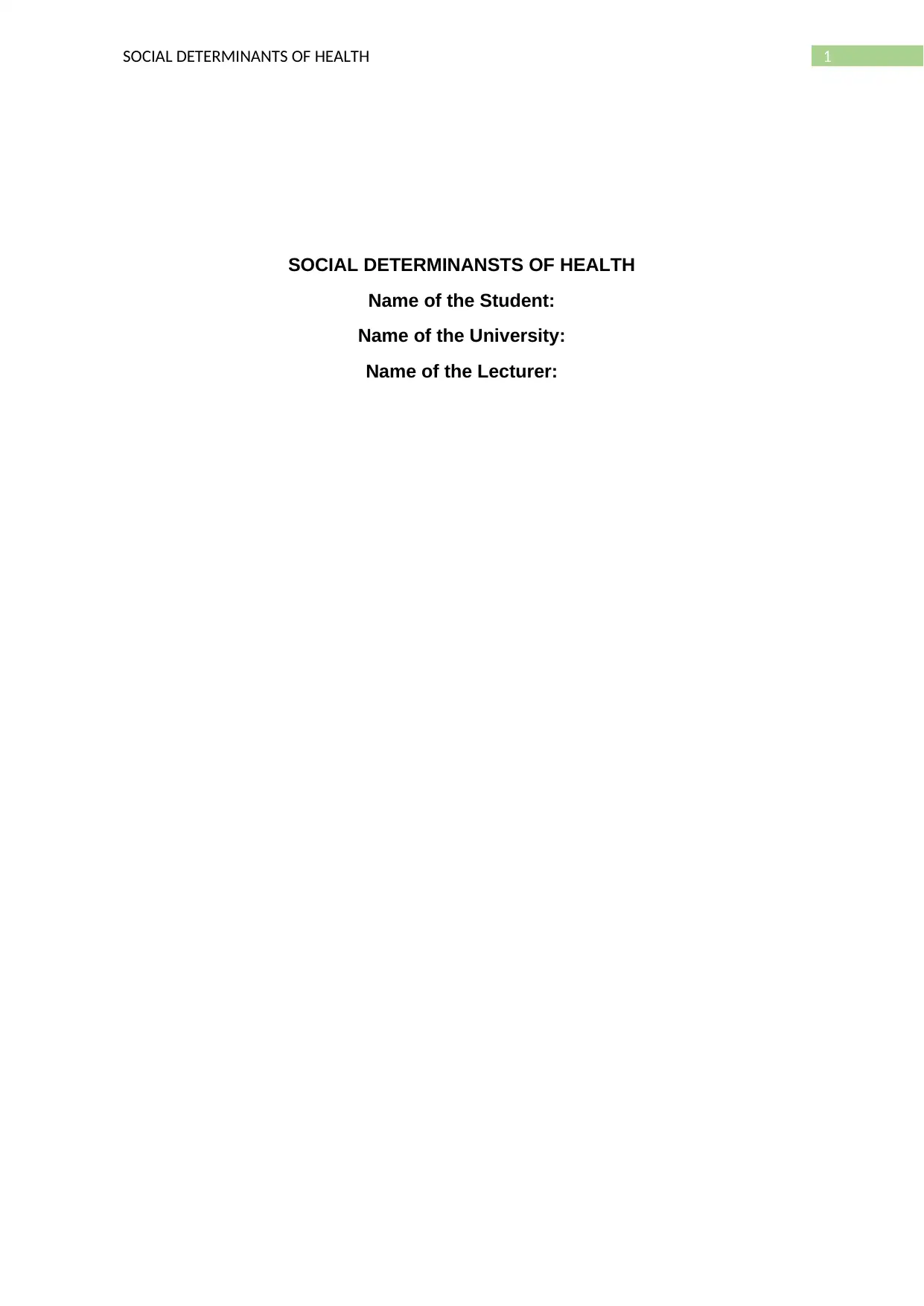
1SOCIAL DETERMINANTS OF HEALTH
SOCIAL DETERMINANSTS OF HEALTH
Name of the Student:
Name of the University:
Name of the Lecturer:
SOCIAL DETERMINANSTS OF HEALTH
Name of the Student:
Name of the University:
Name of the Lecturer:
Paraphrase This Document
Need a fresh take? Get an instant paraphrase of this document with our AI Paraphraser
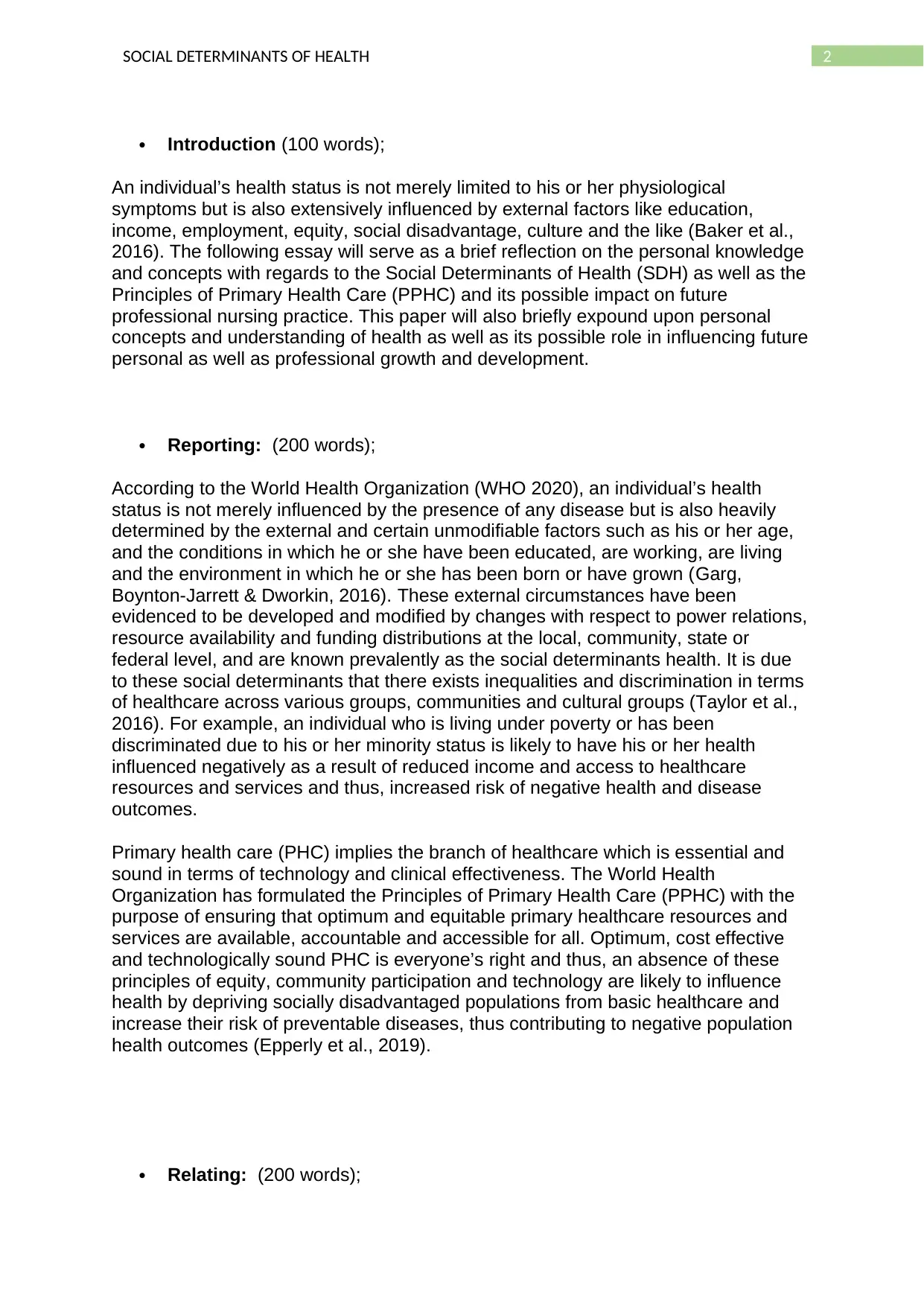
2SOCIAL DETERMINANTS OF HEALTH
Introduction (100 words);
An individual’s health status is not merely limited to his or her physiological
symptoms but is also extensively influenced by external factors like education,
income, employment, equity, social disadvantage, culture and the like (Baker et al.,
2016). The following essay will serve as a brief reflection on the personal knowledge
and concepts with regards to the Social Determinants of Health (SDH) as well as the
Principles of Primary Health Care (PPHC) and its possible impact on future
professional nursing practice. This paper will also briefly expound upon personal
concepts and understanding of health as well as its possible role in influencing future
personal as well as professional growth and development.
Reporting: (200 words);
According to the World Health Organization (WHO 2020), an individual’s health
status is not merely influenced by the presence of any disease but is also heavily
determined by the external and certain unmodifiable factors such as his or her age,
and the conditions in which he or she have been educated, are working, are living
and the environment in which he or she has been born or have grown (Garg,
Boynton-Jarrett & Dworkin, 2016). These external circumstances have been
evidenced to be developed and modified by changes with respect to power relations,
resource availability and funding distributions at the local, community, state or
federal level, and are known prevalently as the social determinants health. It is due
to these social determinants that there exists inequalities and discrimination in terms
of healthcare across various groups, communities and cultural groups (Taylor et al.,
2016). For example, an individual who is living under poverty or has been
discriminated due to his or her minority status is likely to have his or her health
influenced negatively as a result of reduced income and access to healthcare
resources and services and thus, increased risk of negative health and disease
outcomes.
Primary health care (PHC) implies the branch of healthcare which is essential and
sound in terms of technology and clinical effectiveness. The World Health
Organization has formulated the Principles of Primary Health Care (PPHC) with the
purpose of ensuring that optimum and equitable primary healthcare resources and
services are available, accountable and accessible for all. Optimum, cost effective
and technologically sound PHC is everyone’s right and thus, an absence of these
principles of equity, community participation and technology are likely to influence
health by depriving socially disadvantaged populations from basic healthcare and
increase their risk of preventable diseases, thus contributing to negative population
health outcomes (Epperly et al., 2019).
Relating: (200 words);
Introduction (100 words);
An individual’s health status is not merely limited to his or her physiological
symptoms but is also extensively influenced by external factors like education,
income, employment, equity, social disadvantage, culture and the like (Baker et al.,
2016). The following essay will serve as a brief reflection on the personal knowledge
and concepts with regards to the Social Determinants of Health (SDH) as well as the
Principles of Primary Health Care (PPHC) and its possible impact on future
professional nursing practice. This paper will also briefly expound upon personal
concepts and understanding of health as well as its possible role in influencing future
personal as well as professional growth and development.
Reporting: (200 words);
According to the World Health Organization (WHO 2020), an individual’s health
status is not merely influenced by the presence of any disease but is also heavily
determined by the external and certain unmodifiable factors such as his or her age,
and the conditions in which he or she have been educated, are working, are living
and the environment in which he or she has been born or have grown (Garg,
Boynton-Jarrett & Dworkin, 2016). These external circumstances have been
evidenced to be developed and modified by changes with respect to power relations,
resource availability and funding distributions at the local, community, state or
federal level, and are known prevalently as the social determinants health. It is due
to these social determinants that there exists inequalities and discrimination in terms
of healthcare across various groups, communities and cultural groups (Taylor et al.,
2016). For example, an individual who is living under poverty or has been
discriminated due to his or her minority status is likely to have his or her health
influenced negatively as a result of reduced income and access to healthcare
resources and services and thus, increased risk of negative health and disease
outcomes.
Primary health care (PHC) implies the branch of healthcare which is essential and
sound in terms of technology and clinical effectiveness. The World Health
Organization has formulated the Principles of Primary Health Care (PPHC) with the
purpose of ensuring that optimum and equitable primary healthcare resources and
services are available, accountable and accessible for all. Optimum, cost effective
and technologically sound PHC is everyone’s right and thus, an absence of these
principles of equity, community participation and technology are likely to influence
health by depriving socially disadvantaged populations from basic healthcare and
increase their risk of preventable diseases, thus contributing to negative population
health outcomes (Epperly et al., 2019).
Relating: (200 words);
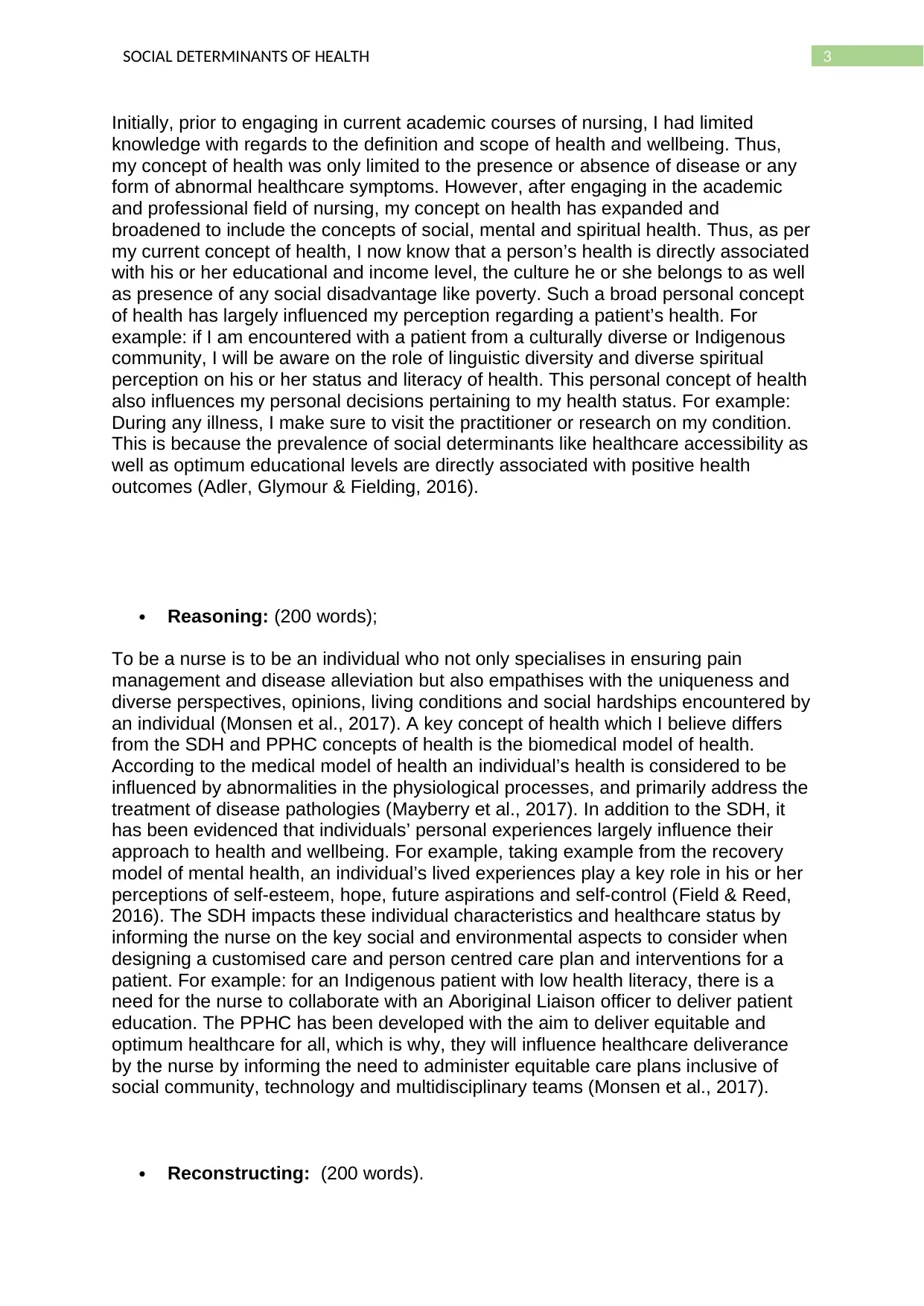
3SOCIAL DETERMINANTS OF HEALTH
Initially, prior to engaging in current academic courses of nursing, I had limited
knowledge with regards to the definition and scope of health and wellbeing. Thus,
my concept of health was only limited to the presence or absence of disease or any
form of abnormal healthcare symptoms. However, after engaging in the academic
and professional field of nursing, my concept on health has expanded and
broadened to include the concepts of social, mental and spiritual health. Thus, as per
my current concept of health, I now know that a person’s health is directly associated
with his or her educational and income level, the culture he or she belongs to as well
as presence of any social disadvantage like poverty. Such a broad personal concept
of health has largely influenced my perception regarding a patient’s health. For
example: if I am encountered with a patient from a culturally diverse or Indigenous
community, I will be aware on the role of linguistic diversity and diverse spiritual
perception on his or her status and literacy of health. This personal concept of health
also influences my personal decisions pertaining to my health status. For example:
During any illness, I make sure to visit the practitioner or research on my condition.
This is because the prevalence of social determinants like healthcare accessibility as
well as optimum educational levels are directly associated with positive health
outcomes (Adler, Glymour & Fielding, 2016).
Reasoning: (200 words);
To be a nurse is to be an individual who not only specialises in ensuring pain
management and disease alleviation but also empathises with the uniqueness and
diverse perspectives, opinions, living conditions and social hardships encountered by
an individual (Monsen et al., 2017). A key concept of health which I believe differs
from the SDH and PPHC concepts of health is the biomedical model of health.
According to the medical model of health an individual’s health is considered to be
influenced by abnormalities in the physiological processes, and primarily address the
treatment of disease pathologies (Mayberry et al., 2017). In addition to the SDH, it
has been evidenced that individuals’ personal experiences largely influence their
approach to health and wellbeing. For example, taking example from the recovery
model of mental health, an individual’s lived experiences play a key role in his or her
perceptions of self-esteem, hope, future aspirations and self-control (Field & Reed,
2016). The SDH impacts these individual characteristics and healthcare status by
informing the nurse on the key social and environmental aspects to consider when
designing a customised care and person centred care plan and interventions for a
patient. For example: for an Indigenous patient with low health literacy, there is a
need for the nurse to collaborate with an Aboriginal Liaison officer to deliver patient
education. The PPHC has been developed with the aim to deliver equitable and
optimum healthcare for all, which is why, they will influence healthcare deliverance
by the nurse by informing the need to administer equitable care plans inclusive of
social community, technology and multidisciplinary teams (Monsen et al., 2017).
Reconstructing: (200 words).
Initially, prior to engaging in current academic courses of nursing, I had limited
knowledge with regards to the definition and scope of health and wellbeing. Thus,
my concept of health was only limited to the presence or absence of disease or any
form of abnormal healthcare symptoms. However, after engaging in the academic
and professional field of nursing, my concept on health has expanded and
broadened to include the concepts of social, mental and spiritual health. Thus, as per
my current concept of health, I now know that a person’s health is directly associated
with his or her educational and income level, the culture he or she belongs to as well
as presence of any social disadvantage like poverty. Such a broad personal concept
of health has largely influenced my perception regarding a patient’s health. For
example: if I am encountered with a patient from a culturally diverse or Indigenous
community, I will be aware on the role of linguistic diversity and diverse spiritual
perception on his or her status and literacy of health. This personal concept of health
also influences my personal decisions pertaining to my health status. For example:
During any illness, I make sure to visit the practitioner or research on my condition.
This is because the prevalence of social determinants like healthcare accessibility as
well as optimum educational levels are directly associated with positive health
outcomes (Adler, Glymour & Fielding, 2016).
Reasoning: (200 words);
To be a nurse is to be an individual who not only specialises in ensuring pain
management and disease alleviation but also empathises with the uniqueness and
diverse perspectives, opinions, living conditions and social hardships encountered by
an individual (Monsen et al., 2017). A key concept of health which I believe differs
from the SDH and PPHC concepts of health is the biomedical model of health.
According to the medical model of health an individual’s health is considered to be
influenced by abnormalities in the physiological processes, and primarily address the
treatment of disease pathologies (Mayberry et al., 2017). In addition to the SDH, it
has been evidenced that individuals’ personal experiences largely influence their
approach to health and wellbeing. For example, taking example from the recovery
model of mental health, an individual’s lived experiences play a key role in his or her
perceptions of self-esteem, hope, future aspirations and self-control (Field & Reed,
2016). The SDH impacts these individual characteristics and healthcare status by
informing the nurse on the key social and environmental aspects to consider when
designing a customised care and person centred care plan and interventions for a
patient. For example: for an Indigenous patient with low health literacy, there is a
need for the nurse to collaborate with an Aboriginal Liaison officer to deliver patient
education. The PPHC has been developed with the aim to deliver equitable and
optimum healthcare for all, which is why, they will influence healthcare deliverance
by the nurse by informing the need to administer equitable care plans inclusive of
social community, technology and multidisciplinary teams (Monsen et al., 2017).
Reconstructing: (200 words).
⊘ This is a preview!⊘
Do you want full access?
Subscribe today to unlock all pages.

Trusted by 1+ million students worldwide
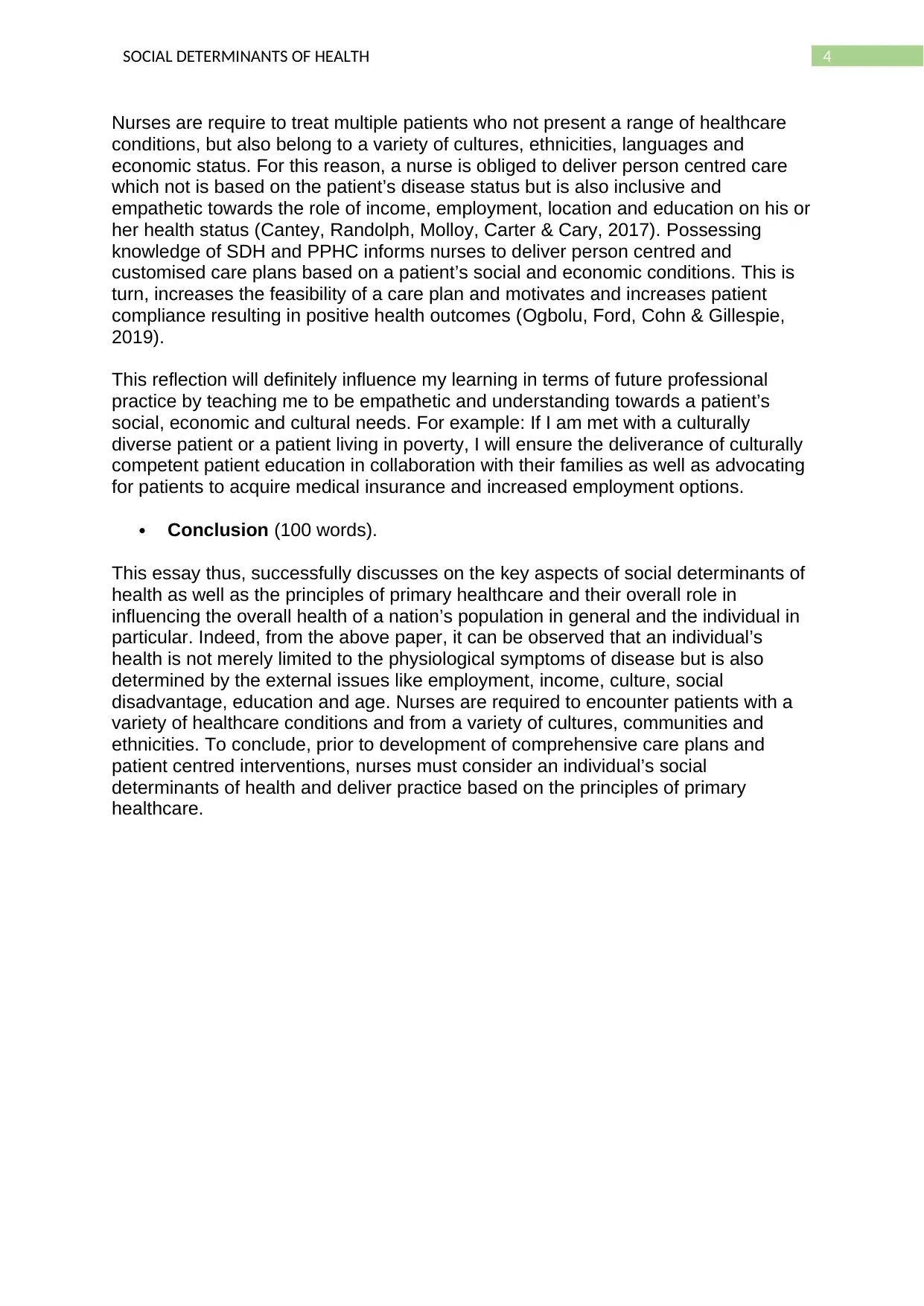
4SOCIAL DETERMINANTS OF HEALTH
Nurses are require to treat multiple patients who not present a range of healthcare
conditions, but also belong to a variety of cultures, ethnicities, languages and
economic status. For this reason, a nurse is obliged to deliver person centred care
which not is based on the patient’s disease status but is also inclusive and
empathetic towards the role of income, employment, location and education on his or
her health status (Cantey, Randolph, Molloy, Carter & Cary, 2017). Possessing
knowledge of SDH and PPHC informs nurses to deliver person centred and
customised care plans based on a patient’s social and economic conditions. This is
turn, increases the feasibility of a care plan and motivates and increases patient
compliance resulting in positive health outcomes (Ogbolu, Ford, Cohn & Gillespie,
2019).
This reflection will definitely influence my learning in terms of future professional
practice by teaching me to be empathetic and understanding towards a patient’s
social, economic and cultural needs. For example: If I am met with a culturally
diverse patient or a patient living in poverty, I will ensure the deliverance of culturally
competent patient education in collaboration with their families as well as advocating
for patients to acquire medical insurance and increased employment options.
Conclusion (100 words).
This essay thus, successfully discusses on the key aspects of social determinants of
health as well as the principles of primary healthcare and their overall role in
influencing the overall health of a nation’s population in general and the individual in
particular. Indeed, from the above paper, it can be observed that an individual’s
health is not merely limited to the physiological symptoms of disease but is also
determined by the external issues like employment, income, culture, social
disadvantage, education and age. Nurses are required to encounter patients with a
variety of healthcare conditions and from a variety of cultures, communities and
ethnicities. To conclude, prior to development of comprehensive care plans and
patient centred interventions, nurses must consider an individual’s social
determinants of health and deliver practice based on the principles of primary
healthcare.
Nurses are require to treat multiple patients who not present a range of healthcare
conditions, but also belong to a variety of cultures, ethnicities, languages and
economic status. For this reason, a nurse is obliged to deliver person centred care
which not is based on the patient’s disease status but is also inclusive and
empathetic towards the role of income, employment, location and education on his or
her health status (Cantey, Randolph, Molloy, Carter & Cary, 2017). Possessing
knowledge of SDH and PPHC informs nurses to deliver person centred and
customised care plans based on a patient’s social and economic conditions. This is
turn, increases the feasibility of a care plan and motivates and increases patient
compliance resulting in positive health outcomes (Ogbolu, Ford, Cohn & Gillespie,
2019).
This reflection will definitely influence my learning in terms of future professional
practice by teaching me to be empathetic and understanding towards a patient’s
social, economic and cultural needs. For example: If I am met with a culturally
diverse patient or a patient living in poverty, I will ensure the deliverance of culturally
competent patient education in collaboration with their families as well as advocating
for patients to acquire medical insurance and increased employment options.
Conclusion (100 words).
This essay thus, successfully discusses on the key aspects of social determinants of
health as well as the principles of primary healthcare and their overall role in
influencing the overall health of a nation’s population in general and the individual in
particular. Indeed, from the above paper, it can be observed that an individual’s
health is not merely limited to the physiological symptoms of disease but is also
determined by the external issues like employment, income, culture, social
disadvantage, education and age. Nurses are required to encounter patients with a
variety of healthcare conditions and from a variety of cultures, communities and
ethnicities. To conclude, prior to development of comprehensive care plans and
patient centred interventions, nurses must consider an individual’s social
determinants of health and deliver practice based on the principles of primary
healthcare.
Paraphrase This Document
Need a fresh take? Get an instant paraphrase of this document with our AI Paraphraser
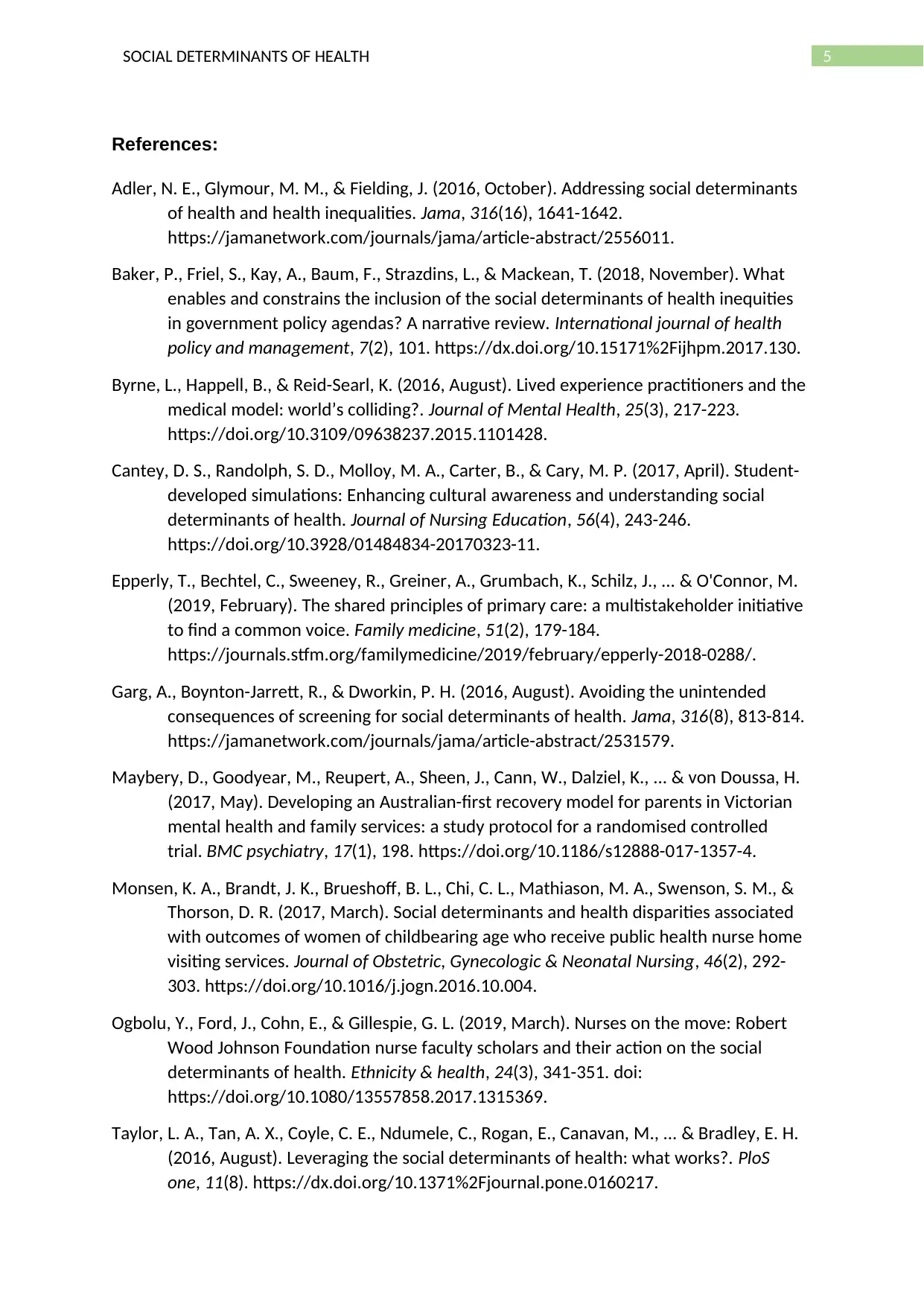
5SOCIAL DETERMINANTS OF HEALTH
References:
Adler, N. E., Glymour, M. M., & Fielding, J. (2016, October). Addressing social determinants
of health and health inequalities. Jama, 316(16), 1641-1642.
https://jamanetwork.com/journals/jama/article-abstract/2556011.
Baker, P., Friel, S., Kay, A., Baum, F., Strazdins, L., & Mackean, T. (2018, November). What
enables and constrains the inclusion of the social determinants of health inequities
in government policy agendas? A narrative review. International journal of health
policy and management, 7(2), 101. https://dx.doi.org/10.15171%2Fijhpm.2017.130.
Byrne, L., Happell, B., & Reid-Searl, K. (2016, August). Lived experience practitioners and the
medical model: world’s colliding?. Journal of Mental Health, 25(3), 217-223.
https://doi.org/10.3109/09638237.2015.1101428.
Cantey, D. S., Randolph, S. D., Molloy, M. A., Carter, B., & Cary, M. P. (2017, April). Student-
developed simulations: Enhancing cultural awareness and understanding social
determinants of health. Journal of Nursing Education, 56(4), 243-246.
https://doi.org/10.3928/01484834-20170323-11.
Epperly, T., Bechtel, C., Sweeney, R., Greiner, A., Grumbach, K., Schilz, J., ... & O'Connor, M.
(2019, February). The shared principles of primary care: a multistakeholder initiative
to find a common voice. Family medicine, 51(2), 179-184.
https://journals.stfm.org/familymedicine/2019/february/epperly-2018-0288/.
Garg, A., Boynton-Jarrett, R., & Dworkin, P. H. (2016, August). Avoiding the unintended
consequences of screening for social determinants of health. Jama, 316(8), 813-814.
https://jamanetwork.com/journals/jama/article-abstract/2531579.
Maybery, D., Goodyear, M., Reupert, A., Sheen, J., Cann, W., Dalziel, K., ... & von Doussa, H.
(2017, May). Developing an Australian-first recovery model for parents in Victorian
mental health and family services: a study protocol for a randomised controlled
trial. BMC psychiatry, 17(1), 198. https://doi.org/10.1186/s12888-017-1357-4.
Monsen, K. A., Brandt, J. K., Brueshoff, B. L., Chi, C. L., Mathiason, M. A., Swenson, S. M., &
Thorson, D. R. (2017, March). Social determinants and health disparities associated
with outcomes of women of childbearing age who receive public health nurse home
visiting services. Journal of Obstetric, Gynecologic & Neonatal Nursing, 46(2), 292-
303. https://doi.org/10.1016/j.jogn.2016.10.004.
Ogbolu, Y., Ford, J., Cohn, E., & Gillespie, G. L. (2019, March). Nurses on the move: Robert
Wood Johnson Foundation nurse faculty scholars and their action on the social
determinants of health. Ethnicity & health, 24(3), 341-351. doi:
https://doi.org/10.1080/13557858.2017.1315369.
Taylor, L. A., Tan, A. X., Coyle, C. E., Ndumele, C., Rogan, E., Canavan, M., ... & Bradley, E. H.
(2016, August). Leveraging the social determinants of health: what works?. PloS
one, 11(8). https://dx.doi.org/10.1371%2Fjournal.pone.0160217.
References:
Adler, N. E., Glymour, M. M., & Fielding, J. (2016, October). Addressing social determinants
of health and health inequalities. Jama, 316(16), 1641-1642.
https://jamanetwork.com/journals/jama/article-abstract/2556011.
Baker, P., Friel, S., Kay, A., Baum, F., Strazdins, L., & Mackean, T. (2018, November). What
enables and constrains the inclusion of the social determinants of health inequities
in government policy agendas? A narrative review. International journal of health
policy and management, 7(2), 101. https://dx.doi.org/10.15171%2Fijhpm.2017.130.
Byrne, L., Happell, B., & Reid-Searl, K. (2016, August). Lived experience practitioners and the
medical model: world’s colliding?. Journal of Mental Health, 25(3), 217-223.
https://doi.org/10.3109/09638237.2015.1101428.
Cantey, D. S., Randolph, S. D., Molloy, M. A., Carter, B., & Cary, M. P. (2017, April). Student-
developed simulations: Enhancing cultural awareness and understanding social
determinants of health. Journal of Nursing Education, 56(4), 243-246.
https://doi.org/10.3928/01484834-20170323-11.
Epperly, T., Bechtel, C., Sweeney, R., Greiner, A., Grumbach, K., Schilz, J., ... & O'Connor, M.
(2019, February). The shared principles of primary care: a multistakeholder initiative
to find a common voice. Family medicine, 51(2), 179-184.
https://journals.stfm.org/familymedicine/2019/february/epperly-2018-0288/.
Garg, A., Boynton-Jarrett, R., & Dworkin, P. H. (2016, August). Avoiding the unintended
consequences of screening for social determinants of health. Jama, 316(8), 813-814.
https://jamanetwork.com/journals/jama/article-abstract/2531579.
Maybery, D., Goodyear, M., Reupert, A., Sheen, J., Cann, W., Dalziel, K., ... & von Doussa, H.
(2017, May). Developing an Australian-first recovery model for parents in Victorian
mental health and family services: a study protocol for a randomised controlled
trial. BMC psychiatry, 17(1), 198. https://doi.org/10.1186/s12888-017-1357-4.
Monsen, K. A., Brandt, J. K., Brueshoff, B. L., Chi, C. L., Mathiason, M. A., Swenson, S. M., &
Thorson, D. R. (2017, March). Social determinants and health disparities associated
with outcomes of women of childbearing age who receive public health nurse home
visiting services. Journal of Obstetric, Gynecologic & Neonatal Nursing, 46(2), 292-
303. https://doi.org/10.1016/j.jogn.2016.10.004.
Ogbolu, Y., Ford, J., Cohn, E., & Gillespie, G. L. (2019, March). Nurses on the move: Robert
Wood Johnson Foundation nurse faculty scholars and their action on the social
determinants of health. Ethnicity & health, 24(3), 341-351. doi:
https://doi.org/10.1080/13557858.2017.1315369.
Taylor, L. A., Tan, A. X., Coyle, C. E., Ndumele, C., Rogan, E., Canavan, M., ... & Bradley, E. H.
(2016, August). Leveraging the social determinants of health: what works?. PloS
one, 11(8). https://dx.doi.org/10.1371%2Fjournal.pone.0160217.
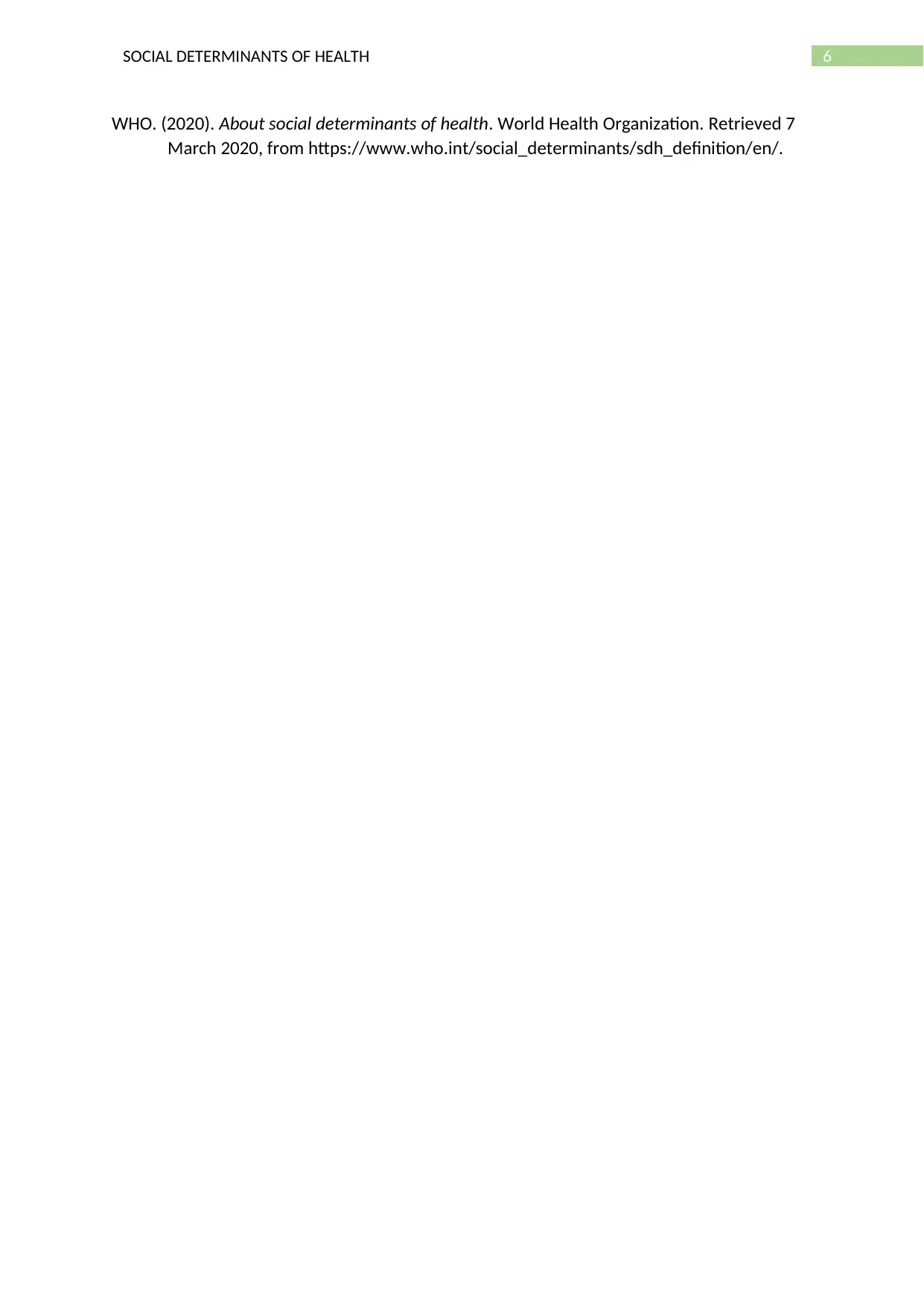
6SOCIAL DETERMINANTS OF HEALTH
WHO. (2020). About social determinants of health. World Health Organization. Retrieved 7
March 2020, from https://www.who.int/social_determinants/sdh_definition/en/.
WHO. (2020). About social determinants of health. World Health Organization. Retrieved 7
March 2020, from https://www.who.int/social_determinants/sdh_definition/en/.
⊘ This is a preview!⊘
Do you want full access?
Subscribe today to unlock all pages.

Trusted by 1+ million students worldwide
1 out of 6
Related Documents
Your All-in-One AI-Powered Toolkit for Academic Success.
+13062052269
info@desklib.com
Available 24*7 on WhatsApp / Email
![[object Object]](/_next/static/media/star-bottom.7253800d.svg)
Unlock your academic potential
Copyright © 2020–2026 A2Z Services. All Rights Reserved. Developed and managed by ZUCOL.





